
William Shakespeare (1564–1616) wrote sonnets on a variety of themes. When discussing or referring to Shakespeare's sonnets, it is almost always a reference to the 154 sonnets that were first published all together in a quarto in 1609. However, there are six additional sonnets that Shakespeare wrote and included in the plays Romeo and Juliet, Henry V and Love's Labour's Lost. There is also a partial sonnet found in the play Edward III.

Dame Alice Ellen Terry was a leading English actress of the late 19th and early 20th centuries.

Dame Edith Mary Evans, was an English actress. She was best known for her work on the stage, but also appeared in films at the beginning and towards the end of her career. Between 1964 and 1968, she was nominated for three Academy Awards.

Emilia Lanier, néeAemilia Bassano, was an English poet and the first woman in England to assert herself as a professional poet, through her volume Salve Deus Rex Judaeorum. Attempts have been made to equate her with Shakespeare's "Dark Lady".

Gloriana, Op. 53, is an opera in three acts by Benjamin Britten to an English libretto by William Plomer, based on Lytton Strachey's 1928 Elizabeth and Essex: A Tragic History. The first performance was presented at the Royal Opera House, London, in 1953 during the celebrations of the coronation of Queen Elizabeth II. Gloriana was the name given by the 16th-century poet Edmund Spenser to his character representing Queen Elizabeth I in his poem The Faerie Queene. It became the popular name given to Elizabeth I.
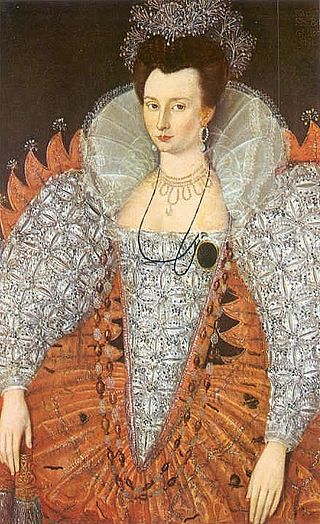
Mary Fitton was an Elizabethan gentlewoman who became a maid of honour to Queen Elizabeth. She is noted for her scandalous affairs with William Herbert, 3rd Earl of Pembroke, Vice-Admiral Sir Richard Leveson, and others. She is considered by some to be the "Dark Lady" of Shakespeare's sonnets.
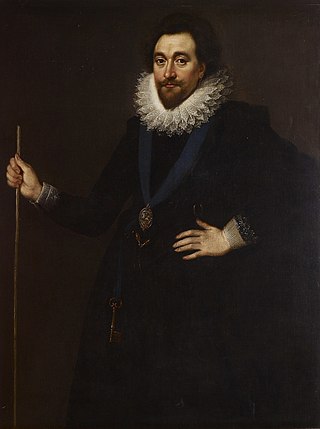
William Herbert, 3rd Earl of Pembroke, of Wilton House in Wiltshire, was an English nobleman, politician and courtier. He served as Chancellor of the University of Oxford and together with King James I founded Pembroke College, Oxford. In 1608 he was appointed Warden of the Forest of Dean, Constable of St Briavels Castle, Gloucestershire, and in 1609 Governor of Portsmouth, all of which offices he retained until his death. He served as Lord Chamberlain from 1615 to 1625. In 1623 the First Folio of Shakespeare's plays was dedicated to him and his brother and successor Philip Herbert, 1st Earl of Montgomery.

William Shakespeare's sexuality has been the subject of frequent debates. It is known from public records that he married Anne Hathaway and had three children with her; scholars have examined their relationship through documents, and particularly through the bequests to her in his will. Some historians have speculated Shakespeare had affairs with other women, based on contemporaries' written anecdotes of such affairs and sometimes on the "Dark Lady" figure in his sonnets. Some scholars have argued he was bisexual, based on analysis of the sonnets; many, including Sonnet 18, are love poems addressed to a man, and contain puns relating to homosexuality.

As the last in the famed collection of sonnets written by English poet and playwright William Shakespeare from 1592 to 1598, Sonnet 154 is most often thought of in a pair with the previous sonnet, number 153. As A. L. Rowse states in Shakespeare's Sonnets: The Problems Solved, Sonnets 153 and 154 "are not unsuitably placed as a kind of coda to the Dark Lady Sonnets, to which they relate." Rowse calls attention to the fact that Sonnets 153 and 154 "serve quite well to round off the affair Shakespeare had with Emilia, the woman characterized as the Dark Lady, and the section of the Dark Lady sonnets". Shakespeare used Greek mythology to address love and despair in relationships. The material in Sonnets 153 and 154 has been shown to relate to the six-line epigram ascribed to Marianus Scholasticus in the Greek Anthology. The epigram resembles Sonnets 153 and 154, addressing love and the story of Cupid, the torch, and the Nymph's attempt to extinguish the torch.

Sonnet 57 is one of 154 sonnets written by the English playwright and poet William Shakespeare. It is a member of the Fair Youth sequence, in which the poet expresses his love towards a young man. Sonnet 57 is connected with Sonnet 58 which pursues the theme of the poet as a slave of the beloved.
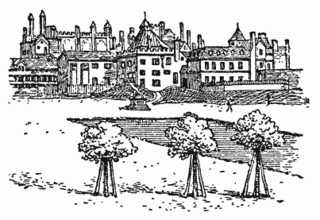
The Cockpit-in-Court was an early theatre in London, located at the Palace of Whitehall, next to St. James's Park, now the site of 70 Whitehall, in Westminster.

Sonnet 141 is the informal name given to the 141st of William Shakespeare's 154 sonnets. The theme of the sonnet is the discrepancy between the poet's physical senses and wits (intellect) on the one hand and his heart on the other. The "five wits" that are mentioned refer to the mental faculties of common sense, imagination, fantasy, instinct, and memory. The sonnet is one of several in which the poet's heart is infatuated despite what his eyes can see.

Sonnet 144 was published in the Passionate Pilgrim (1599). Shortly before this, Francis Meres referred to Shakespeare's Sonnets in his handbook of Elizabethan poetry, Palladis Tamia, or Wit's Treasurie, published in 1598, which was frequently talked about in the literary centers of London taverns. Shakespeare's sonnets are mostly addressed to a young man, but the chief subject of Sonnet 127 through Sonnet 152 is the "dark lady". Several sonnets portray a conflicted relationship between the speaker, the "dark lady" and the young man. Sonnet 144 is one of the most prominent sonnets to address this conflict.

Sonnet 133 is a poem in sonnet form written by William Shakespeare, first published in 1609.

Margaret Rawlings, Lady Barlow was an English stage actress, born in Osaka, Japan, daughter of the Rev. George William Rawlings and his wife Lilian Rawlings.

A Waste of Shame is a 90-minute television drama on the circumstances surrounding William Shakespeare's composition of his sonnets. It takes its title from the first line of Sonnet 129. It was first broadcast on BBC Four on 22 November 2005 as part of the supporting programming for the BBC's ShakespeaRe-Told season, but was only loosely connected to the rest of the series.
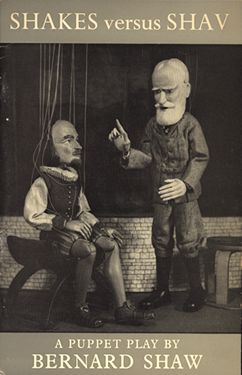
Shakes versus Shav (1949) is a puppet play written by George Bernard Shaw. It was Shaw's last completed dramatic work. The play runs for 10 minutes in performance and comprises a comic argument between Shaw and Shakespeare, with the two playwrights bickering about who is the better writer as a form of intellectual equivalent of Punch and Judy.
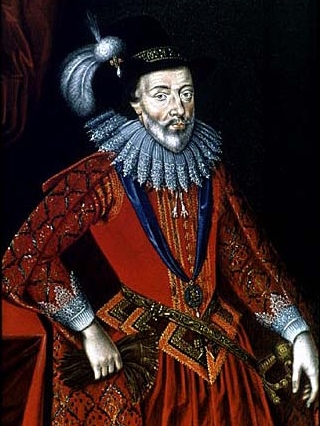
The Derbyite theory of Shakespeare authorship is the view that William Stanley, 6th Earl of Derby (1561–1642), was the true author of the works of William Shakespeare. Derby is one of several individuals who have been claimed by advocates of the Shakespeare authorship question to be the true author of Shakespeare's works.
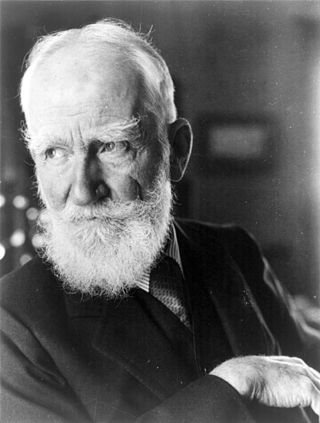
Macbeth Skit (1916) is a short comic skit by George Bernard Shaw on Shakespeare's portrayal of Macbeth's relationship with Lady Macbeth.
The Dark Lady is a woman described in Shakespeare's sonnets, and so called because the poems make it clear that she has black wiry hair, and dark, "dun"-coloured skin. The description of the Dark Lady distinguishes itself from the Fair Youth sequence by being overtly sexual. Among these, Sonnet 151 has been characterised as "bawdy" and is used to illustrate the difference between the spiritual love for the Fair Youth and the sexual love for the Dark Lady. The distinction is commonly made in the introduction to modern editions of the sonnets. As with the Fair Youth sequence, there have been many attempts to identify her with a real historical individual. A widely held scholarly opinion, however, is that the "dark lady" is nothing more than a construct of Shakespeare's imagination and art, and any attempt to identify her with a real person is "pointless".



















